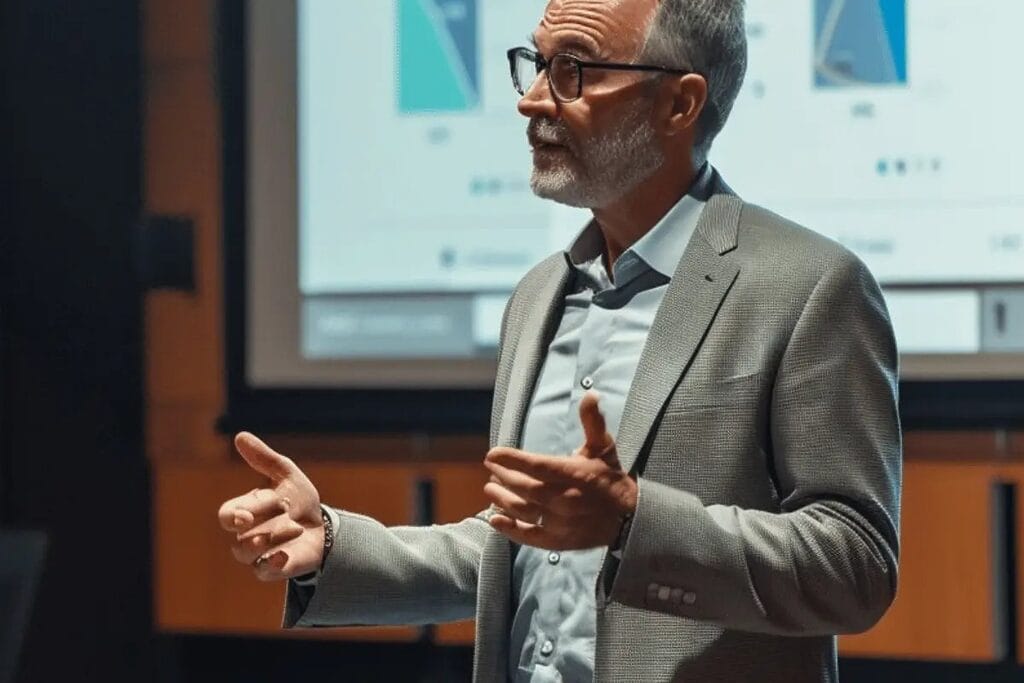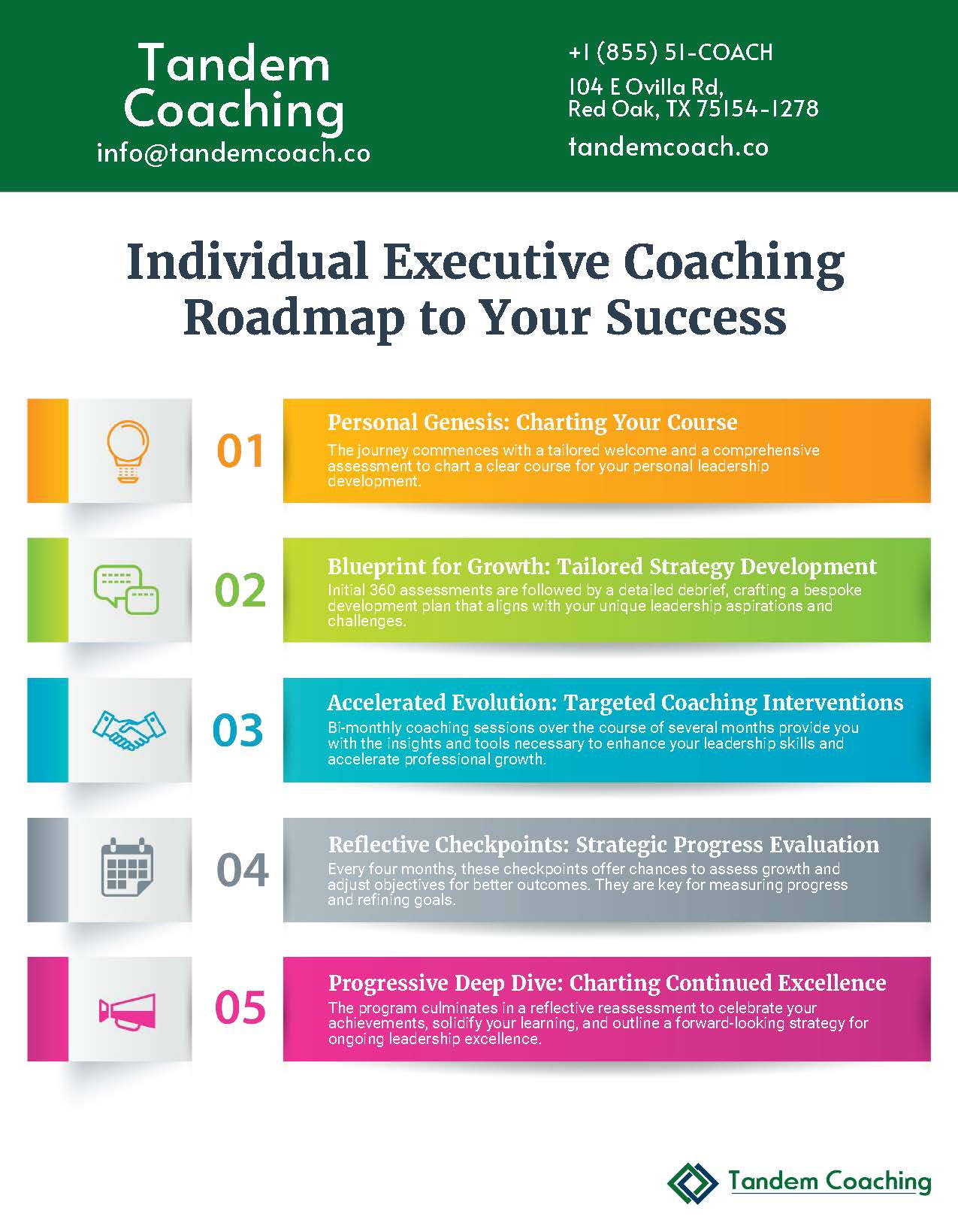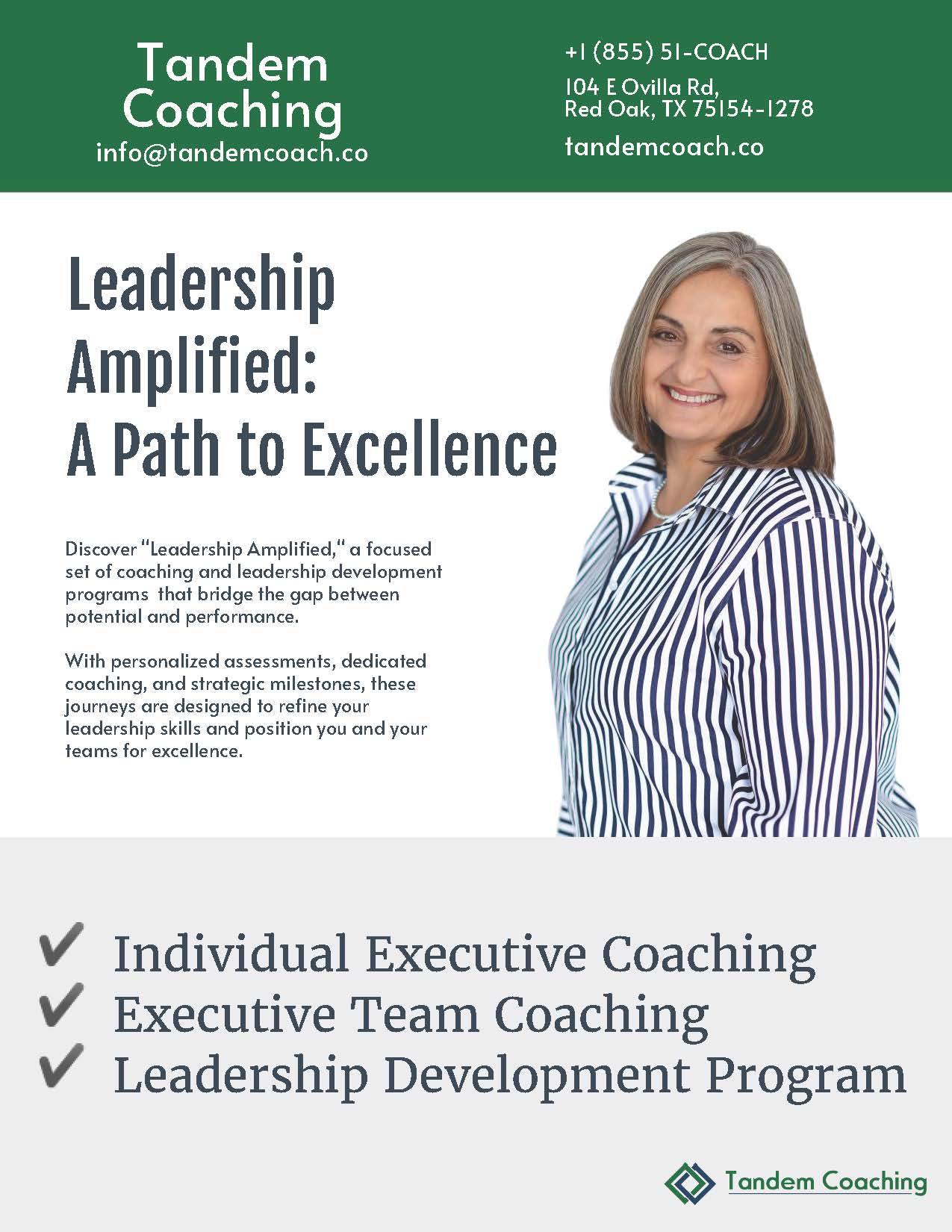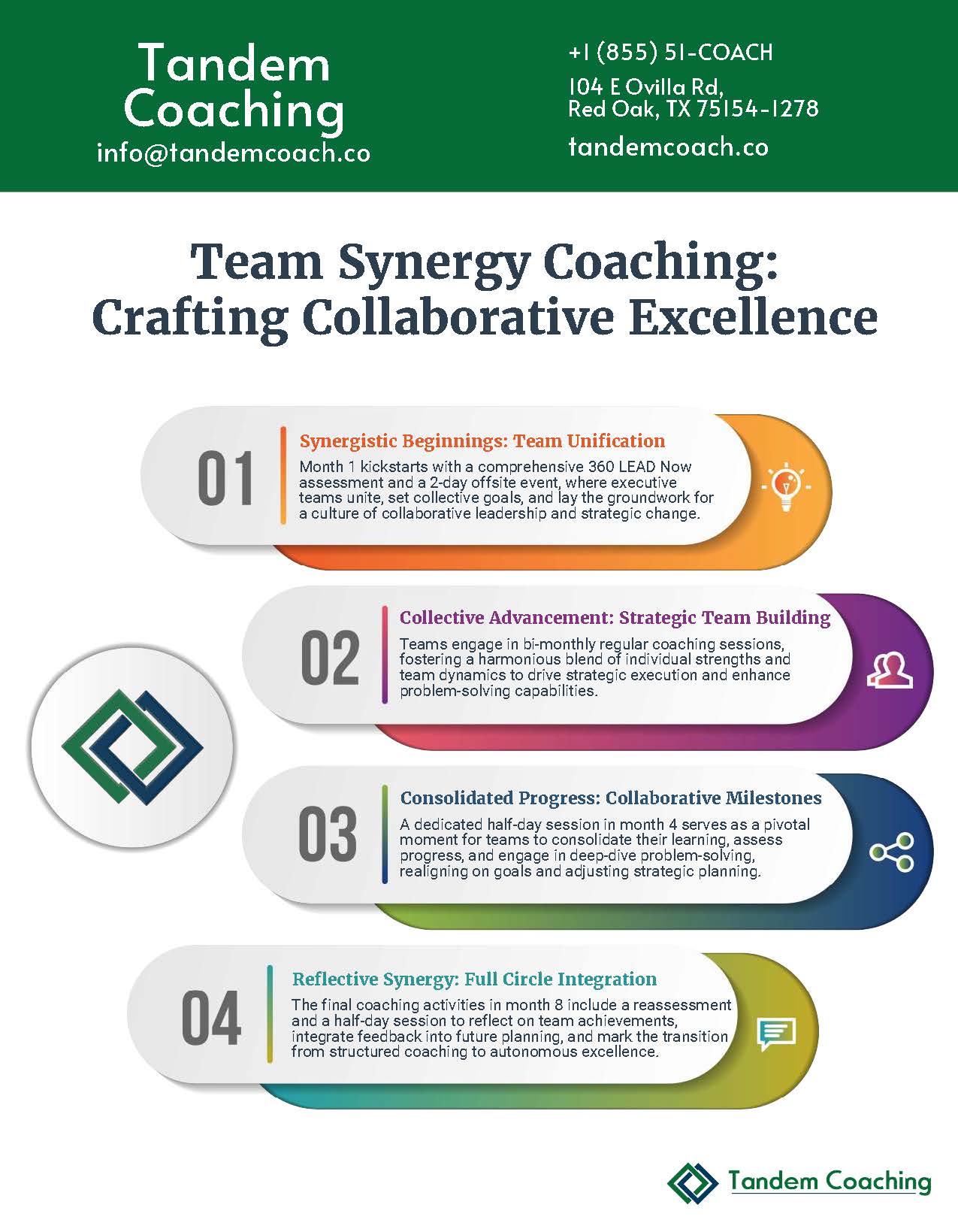Working with an executive coach is a pivotal investment if you want to improve your executive presence and achieve transformational growth.
However, not knowing how to select the right fit may lead to a dead end in the executive-coach partnership. This failure costs organizations millions of dollars in coaching spending annually.
This article provides a clear 8-phase selection framework for finding an executive coach based on proven coaching best practices. Follow these steps to make an informed decision and maximize the benefits of executive coaching.
TL;DR – How to Find an Executive Coach
Here’s a quick rundown of the steps to find an executive coach:
- Define your professional goals and needs
- Research potential coaches
- Check credentials and experience
- Review testimonials and case studies
- Schedule initial consultations
- Compare executive coaching rates
- Assess compatibility and chemistry
- Make your decision and set expectations
We will explore each of these steps in detail later in the guide.
If you’re an executive seeking more effective development, join our personalized executive coaching program at Tandem Coaching.
Our coaches work one-on-one with you to boost your managerial skills. We use the ASPIRE coaching method to help you think strategically, communicate better, and exude a more effective executive presence overall.
Why not take the first step today? Let’s chat about how Tandem can help you reach your goals!

What is an Executive Coach?
An executive coach is a certified professional who collaborates with senior executives (CXOs, top-level management like VPs and directors) and management professionals to help them achieve personal and professional goals.
They employ customized strategies to assist with developing critical skills in areas like:
- Executive presence
- Strategic planning
- Conflict resolution
- Decision making
- Team building
Executive coaches take a holistic approach, factoring in individual strengths, blind spots, managerial style, organizational dynamics, and goals. These coaches typically have extensive business experience.
An executive coach motivates you to maximize your potential through tailored action plans, consistent accountability, and an objective perspective.

What Do Executive Coaches Do?
As executive coaches, we wear many hats in our role.
Here are some vital functions we perform:
- One-on-one coaching sessions centered around strategic priorities
- Administering ProfileXT, Genos EQ, and 360 assessments
- Helping identify blind spots and areas for improvement
- Building organizational capabilities for teams
- Providing resources and tools for growth
- Promoting lasting behavioral changes
- Delivering constructive feedback
- Serving as a trusted confidant
- Facilitating progress tracking
The focus remains on you, the client, throughout the partnership. Coaches ask powerful questions to guide self-discovery instead of providing direct instructions.
This leads to better self-awareness and increased personal motivation to drive impactful changes at work.

Executive Coaching Benefits for Professionals
The benefits of executive coaching are far-reaching and can significantly impact individual performance and organizational success.
Let’s look at the major advantages:
- Enhanced Managerial Abilities: Coaches teach critical skills for organizational influence, such as communicating effectively, managing teams, and maintaining an executive presence.
- Improved Productivity: Executive coaching increases efficiency and goal achievement and helps improve time management.
- Career Advancement: Professional growth, skill development, and overcoming obstacles help pave the way for promotions.
- Work/Life Balance: Coaches enable you to reduce stress, build resilience, and achieve greater work-life harmony.
- Self-Confidence: Executive presence coaching empowers you by refining your capabilities and managerial style, helping you become more confident and self-motivated.
- Improved Organizational Performance: Coaching’s benefits often cascade throughout the organization, leading to improved team performance and business results.
The support system provided by an executive coach gives you an edge for continual improvement. This is reflected in the impressive ROI of executive coaching.
One study by MetrixGlobal, LLC found that coaching produced a 529% return on investment and significant intangible benefits to the business.
The study showed that 60% of participants could identify specific financial benefits from coaching, with increased productivity (cited by 60% of participants) and increased employee satisfaction (53% of participants) being the most significantly impacted.

How to Find an Executive Coach
Finding an executive coach who perfectly matches your growth goals involves following these key steps:
Step 1: Define Your Professional Goals and Needs
Before you start your search, take some time to reflect on what you hope to achieve through coaching. Figure out your problem areas, knowledge gaps, aspirations, and growth targets.
Are you looking to improve specific skills, navigate a career transition, or enhance your overall managerial effectiveness?
Document specific, measurable goals so coaches understand exactly how to help you get there.
Step 2: Research Potential Coaches
Explore multiple sources to find potential executive coaches.
Here are some good ones:
- Ask for recommendations from colleagues or mentors.
- Search professional coaching associations like the International Coach Federation (ICF).
- Use LinkedIn to find coaches in your industry or with relevant experience.
- Check with your company’s HR department for approved coaching providers.
- Explore coaching platforms and directories online.
Step 3: Check Credentials and Experience
Once you have a list of potential coaches, research their backgrounds. Proper certifications indicate that a coach has extensive knowledge of psychology, emotional intelligence, and evidence-based coaching strategies.
Look for:
- ACC, PCC, and MCC certification from the International Coaching Federation (these are ICF certification requirements to become a coach)
- Certified Professional Co-Active Coach (CPCC) certification from Co-Active Training Institute (CTI)
- Master Certified Coach from the International Association of Coaching (IAC)
Some other things that also matter besides certification include:
- Years of coaching experience
- Industry expertise or specializations
- Professional background and achievements
Remember, the best executive coaches often have a mix of business experience and coaching credentials.

Step 4: Review Testimonials and Case Studies
Look for evidence of a coach’s effectiveness. Read testimonials from past clients and ask for case studies demonstrating the coach’s impact.
This can give you insights into their coaching style and the results they’ve helped others achieve.
Step 5: Schedule Initial Consultations
Most reputable coaches offer free initial consultations. Take advantage of these to understand the coach’s style and approach.
Prepare a list of questions to ask during these sessions, such as:
- What is your coaching philosophy?
- How do you typically structure your coaching engagements?
- Can you share an example of how you’ve helped a client achieve similar goals to mine?
Step 6: Compare Executive Coaching Rates
Pricing varies based on certification level, experience, and session duration. According to this report by the Society of Human Resource Managers (SHRM), the average executive coaching rate is around $350 per hour, with a range of $200- $3000 per hour.
Many coaches offer bundled packages, like 25 hours over six months, which may provide more value. Get rate breakdowns from prospective coaches to compare options.
Step 7: Assess Compatibility and Chemistry
This is the most critical step. An incredible resume means little without genuine rapport and trust with your coach. You want someone who inspires you to open up and ask the tough questions.
Pay attention to how you feel during the consultation:
- Do you feel comfortable opening up to this person?
- Do they listen actively and ask insightful questions?
The relationship between coach and client should be amicable, so trust your instincts about personal compatibility.
Step 8: Make Your Decision and Set Expectations
After completing the above steps, you should be ready to choose your executive coach. Once you’ve made your decision:
- Clarify the terms of the coaching engagement (duration, frequency of sessions, etc.)
- Set clear goals and expectations for the coaching relationship
- Establish metrics for measuring progress and success
Take the time to find someone who can truly help you reach your full potential.

What to Look for in an Executive Coach
Beyond just credentials and experience, here is a checklist of top qualities to seek out:
- Relevant Experience: Look for coaches with experience in your industry or with leaders at your level.
- Strong Communication Skills: The best coaches are excellent listeners and can articulate ideas clearly.
- Empathy and Emotional Intelligence: A good coach should be able to understand and relate to your challenges.
- Objectivity: Your coach should provide honest, unbiased feedback.
- Adaptability: Everyone is unique, so your coach should be able to tailor their approach to your needs.
- Commitment to Professional Development: Look for coaches pursuing ongoing education in leadership trends and coaching methodologies.
- Ethical Standards: Ensure your coach adheres to professional ethical guidelines, such as those set by the ICF.
- Results-Oriented Approach: Your coach should be focused on helping you achieve tangible outcomes.
Of course, price point and logistics matter, too. But zeroing in on the above qualities will lead you to a coach who can deliver immense value.

Executive Coaching Service by Tandem Coaching
At Tandem Coaching, we offer personalized 1-on-1 executive coaching crafted specifically for forward-focused professionals ready to transform their careers.
Our approach is tailored to address common challenges faced by executives like:
- Becoming more successful at the new executive level
- Finding ways to enhance yourself and your team’s performance
- Overcoming obstacles holding you back from career progression
- Dealing with a high-stress environment and strategic decision-making
Here are the steps we follow:
- Personal Genesis: Initial assessment to outline leadership trajectory
- Blueprint for Growth: Development plan addressing challenges and ambitions
- Targeted Coaching: Refine skills for measurable leadership advancements
- Reflective Checkpoints: Milestones to evaluate, recalibrate progress
- Continued Excellence: Build on growth through further review and adjustments
Start your executive coaching journey today with Tandem Coaching. Get in touch with us to see how we can help you achieve your goals.

Frequently Asked Questions (FAQs)
Here we answer some commonly asked questions on the executive coaching process:
What Are the Common Coaching Methods Used by Executive Coaches?
Executive coaches employ various methods to support their clients’ growth and development. Some common approaches include:
- GROW Model: This popular framework focuses on Goals, Reality, Options, and Will (or Way Forward).
- 360-Degree Feedback: Coaches gather input from your colleagues, subordinates, and superiors to view your performance comprehensively.
- Strengths-Based Coaching: This approach identifies and leverages your talents and strengths.
- Behavioral Coaching: This method aims to modify behaviors to improve leadership effectiveness.
- Cognitive-Behavioral Coaching: This approach helps you identify and change negative thought patterns hindering your performance.
How Can I Assess the Effectiveness of an Executive Coach Over Time?
You can gauge coaching efficacy by tracking metrics aligned to your desired well-formed executive coaching outcomes, such as key skills developed, career advancements achieved, new business objectives accomplished, and improvements in 360-degree reviews.
What Questions Should I Ask a Potential Executive Coach Before Hiring?
Consider asking the following questions:
- What executive coaching certifications do you hold?
- How many years have you been coaching professionals in my specific field?
- Which coaching methods and frameworks do you use?
- How do you measure success and track progress?
- What does an average coaching session look like?
- How much support do you provide outside sessions?
- What is your policy on confidentiality?
- What differentiates your approach from other executive coaches?
Conclusion
Finding an exceptional executive coach well-matched to your professional advancement goals has never been more vital for staying competitive. While the search process takes effort and diligence, the long-term benefits for your career make it time well invested.
We encourage you to apply the steps outlined here to find a coach ready to help you maximize your potential.
Sometimes, it pays to enlist a dedicated coaching firm — reach out to us at Tandem Coaching. We will match you with a coach who is perfect for you, so you don’t have to attempt this marathon search alone.



Boost Your Leadership Team Success!
Take your leadership team to the next level and achieve great results with our executive coaching.
Learn how our coaching and ASPIRE method can change things for you—get a free brochure to begin your journey.
About the Author
Cherie Silas, MCC
She has over 20 years of experience as a corporate leader and uses that background to partner with business executives and their leadership teams to identify and solve their most challenging people, process, and business problems in measurable ways.















